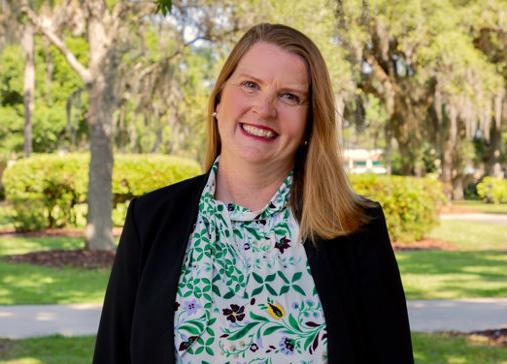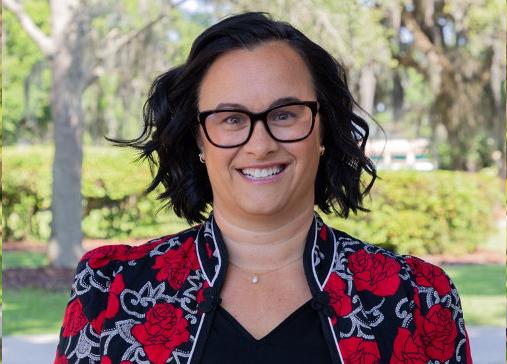-
All coursework must be completed with a 3.2 GPA or higher
-
Anatomy and physiology
-
One course in anatomy with lab AND one course in physiology with lab OR
-
A two-course sequence in anatomy and physiology each with lab
-
-
Two courses in biological sciences (not botany)
-
Two courses in general chemistry with lab
-
Two courses in general physics with lab
-
One course in psychology
-
One course in statistics
-
Brooks Rehabilitation College of Healthcare SciencesDoctor of Physical Therapy Program

Doctor of Physical Therapy ProgramWhy Choose Our Program?
The Brooks Rehabilitation Doctor of Physical Therapy (DPT) program at Jacksonville University is designed to be both efficient and comprehensive, enabling you to enter the workforce sooner with a streamlined 28-month curriculum. Through a dynamic partnership with Brooks Rehabilitation, you’ll gain hands-on clinical experience from the very beginning of the program. While each semester combines classroom instruction and clinical learning, the first four semesters emphasize classroom-based education, and the final three semesters focus primarily on immersive clinical experiences.
Our curriculum is grounded in evidence-based practice, preparing you to work confidently with patients across various conditions and diagnoses. Key topics include lifestyle medicine, interprofessional practice, professional development, critical thinking, and differential diagnosis. You’ll engage in coursework covering the examination and treatment of patients with musculoskeletal, neurological, cardiovascular, and lymphatic conditions.
Upon graduation, you’ll be equipped with the knowledge, skills, and professional attributes to deliver holistic, patient-centered care as a highly competent physical therapist.

About our Program – by the numbers
1 cohort per year every Fall (starting Fall 2026)
38+ weeks of full-time clinical education
Brooks Rehabilitation DPT Program Mission & Vision
Mission
Develop adaptable, empathic, person-centered physical therapists who are empowered to optimize movement through sound clinical reasoning & excellent clinical skills, while valuing leadership, community service, lifelong learning, and belonging.
Vision
Develop physical therapists who will transform the profession, health care, and society.
Faculty

Program Director & Chair
Tobi Baldwin, PT, DPT, EdD
Email: tbaldwi2@messianicfamilyfellowship.com
Dr. Tobi Baldwin has over 20 years of experience in physical therapy education as a professor and administrator. She has presented nationally and published on the topics of clinical reasoning, curriculum development, and formative assessment. Dr. Baldwin received her physical therapy degree from the University of St. Augustine for Health Sciences. She also holds a master’s degree in exercise science from California University of Pennsylvania and a doctorate in education from Walden University. Dr. Baldwin is also a Fellow of the American Academy of Orthopaedic Manual Physical Therapy.

Director of Clinical Education
Amanda Grant, PT, DPT
Email: agrant19@messianicfamilyfellowship.com
Dr. Amanda Grant has practiced clinically in the outpatient orthopedic setting for the past 18 years specializing in orthopaedics and oncology. She has presented nationally on the topics of problem solving and critical thinking as it relates kinetic chain dysfunctions as well as differential diagnosis and clinical management of lymphedema. Dr. Grant earned her degree in physical therapy from the University of St. Augustine for Health Sciences and is an Orthopaedic Certified Specialist as well as a Fellow of the American Academy of Orthopaedic Manual Physical Therapy.
DPT Program Principles
The DPT program at JU utilizes the principles outlined below as fundamental concepts and guidelines for the program. They provide a framework for the faculty and the program for designing and implementing effective learning activities that promote the development of “Dolphin” Physical Therapists who are adaptable, empathic, person-centered and empowered to optimize movement through sound clinical reasoning & excellent clinical skills, while valuing leadership, community service, lifelong learning, and belonging.
D |
Decision-making |
Thread clinical reasoning and critical thinking throughout the program using a consistent framework for all patient populations and practice settings. |
O |
Open-minded |
Promote metacognition and critical inquiry through guided self-reflection, scaffolded coursework, and thought-provoking and meaningful discussions. |
L |
Learning |
Emphasize experiential learning as the cornerstone of learning activities through early and often clinical education. |
P |
Professional |
Adhere to the APTA core values of accountability, altruism, collaboration, compassion & caring, duty, excellence, inclusion, integrity, and social responsibility |
H |
Humanistic |
Create supportive environments to foster inclusion and belonging while nurturing self-esteem and self-efficacy. |
I |
Individuality |
Recognize the unique perspectives each person brings and the importance of their lived experience while working together towards common goals. |
N |
Network |
Participate in and value interdisciplinary patient/client care for optimal outcomes. |
S |
Steadfast |
Develop resilience through personal connections, mental and physical wellness, and a sense of purpose. |
Pre-requisite Coursework
Accreditation
Graduation from a physical therapist education program accredited by the Commission on Accreditation in Physical Therapy Education (CAPTE), is necessary for eligibility to sit for the licensure examination, which is required in all states.
The Commission on Accreditation in Physical Therapy Education
3030 Potomac Ave., Suite 100, Alexandria, Virginia 22305-3085
703-706-3245; accreditation@apta.org
Candidacy is considered to be an accredited status, as such the credits and degree earned from a program with Candidacy status are considered, by CAPTE, to be from an accredited program. Therefore, students in the charter (first) class should be eligible to take the licensure exam even if CAPTE withholds accreditation at the end of the candidacy period. That said, it is up to each state licensing agency, not CAPTE, to determine who is eligible for licensure. Information on licensing requirements should be directed to the Federation of State Boards of Physical Therapy (FSBPT;www.fsbpt.org) or specific state boards (a list of state boards and contact information is available on FSBPT's website).
Jacksonville University is seeking accreditation of a new physical therapist education program from CAPTE. The program is planning to submit an Application for Candidacy, which is the formal application required in the pre-accreditation stage, on May 1, 2025. Submission of this document does not assure that the program will be granted Candidate for Accreditation status. Achievement of Candidate for Accreditation status is required prior to implementation of the professional phase of the program; therefore, no students may be enrolled in professional courses until Candidate for Accreditation status has been achieved. Further, though achievement of Candidate for Accreditation status signifies satisfactory progress toward accreditation, it does not assure that the program will be granted accreditation.
Request for Information
Contact Information Brooks Rehabilitation DPT Program
Phone: (904) 256-7000
Email: graduateadmissions@messianicfamilyfellowship.com
